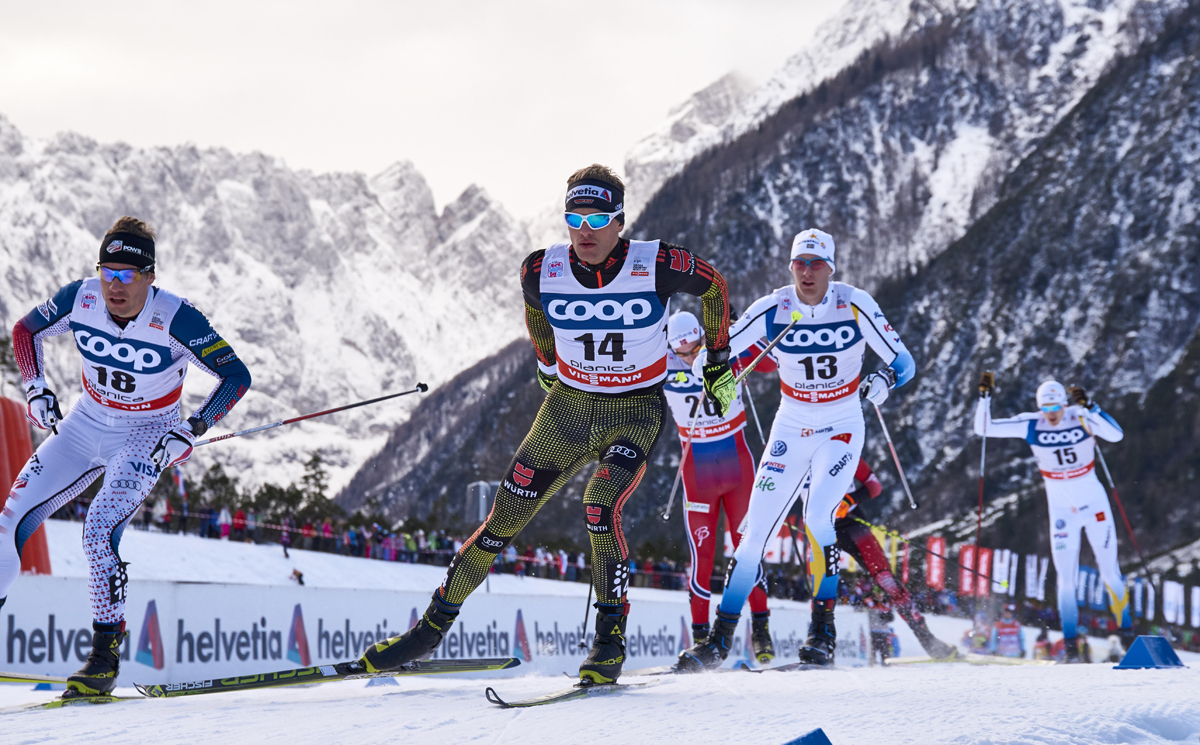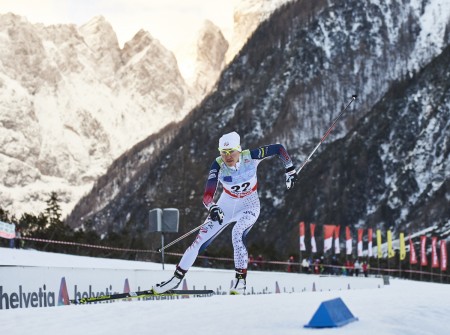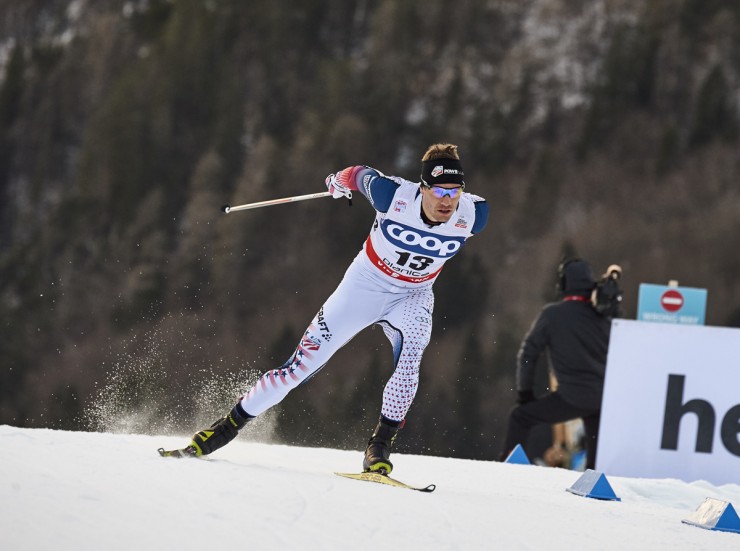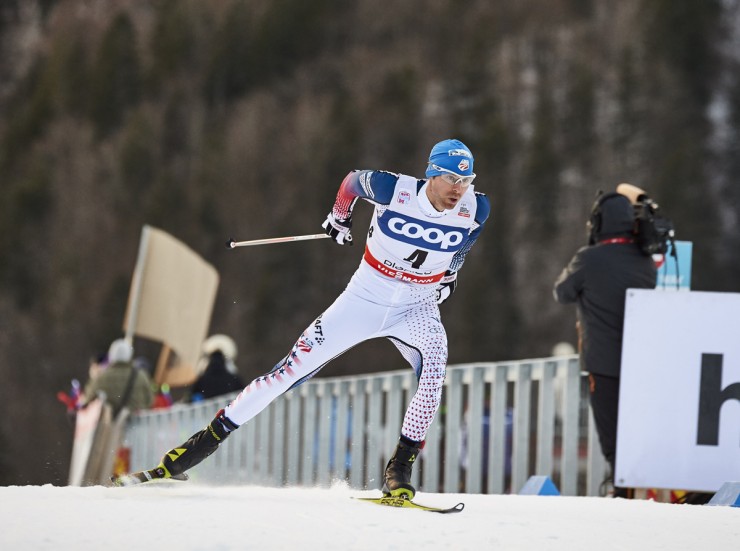
Note: This article has been updated to include comments from Chelsea Holmes.
Racing, at times, serves as a recharge. After qualifying four skiers in Saturday’s 1.2-kilometer freestyle sprint in Planica, Slovenia, but missing the semifinal and final rounds, several U.S. Ski Team members communicated that they’re geared up and ready to give it another go.
“I don’t feel super strongly one way or the other about today,” American Sophie Caldwell said in a phone interview. “It wasn’t a bad day by any means, but it definitely wasn’t what I was hoping for. … I caught a little cold after the Tour de Ski, but I’m hoping today woke my body up and I’ll be ready to go tomorrow.”
Caldwell was coming off her first World Cup victory in the classic sprint on Jan. 5 at Stage 4 of the Tour de Ski.
In Saturday’s freestyle-sprint qualifier, Caldwell clocked the 13th-fastest time, 6.33 seconds behind Norway’s Astrid Uhrenholdt Jacobsen, who won the qualifier in 2:32.29.
Caldwell then raced in the first quarterfinal of the day, which included Swedish sprint specialists Stina Nilsson and Hanna Falk, Finland’s Mona-Liisa Nousiainen, Heidi Widmer of Switzerland, and Slovenia’s Anamarija Lampic.
Heading out of the start, it was the two Swedish skiers in front, followed by Caldwell and Nousiainen in a tie for third. As the group ascended the first climb, Caldwell overtook Nousiainen on the outside left, to position herself in third for the next downhill.
Coming into the final climb of the course, it was three white suits in the front — with Nilsson leading Falk, and Caldwell following close behind.
As the trio made their way into the final 100 meters, the two Swedes broke away from Caldwell, while she responded by pushing hard in an effort to catch Falk in second. She couldn’t quite reach her, finishing third, 0.82 seconds after Falk and 0.92 seconds behind Nilsson, who won the heat and high-fived her teammate across the line.
The second quarterfinal heat was 1.3 seconds faster, and Caldwell ended up missed a lucky loser bid for the semifinals. She finished the day 13th overall.

“I think one of the most challenging parts is staying mentally engaged,” Caldwell said. “With sprint racing, so much can go right and so much can go wrong. The tiniest wrong move can mess up your entire race, if you let it.
“But I think if you have a race that doesn’t go well, being able to put it behind you and gearing up for the next one [is important],” she added.
Caldwell’s teammate Ida Sargent — the only other female U.S. Ski Team member racing — qualified in 21st, 8.94 seconds behind Jacobsen, and also missed advancing to the semifinal.
In the fifth-and-final women’s quarterfinal, Sargent took it out strong from the start, trailing Germany’s Sandra Ringwald while stay ahead of Norway’s Kathrine Rolsted Harsem, Sweden’s Maja Dahlqvist, Germany’s Anne Winkler, and Switzerland’s Nadine Fähndrich.
The two Germans moved into the lead for the course’s sharp righthand turn, while Sargent clung viciously to third.
Heading into the second climb, Fähndrich punched the pace, passing the two Germans on the inside left. Sargent held onto to the Swiss skier’s surge and moved into second.
Fähndrich gapped the field by nearly 40 meters coming into course’s closing downhill, but her burst wasn’t enough to hold off the group for the final climb. As she lost steam, so did Sargent.
Ringwald and Dahlqvist closed in to the right of Sargent, overtaking her, while Harsem pressured from the left heading into the finish.
In the final 50 meters, Harsem and Ringwald passed Fähndrich to take first and second, respectively. Dahlqvist was third (+0.32), Fähndrich fourth (+0.39), and Sargent crossed the line in fifth, 3.38 seconds after Harsem, to end up 23rd overall.
After earning World Cup starts as a Period 1 U.S. SuperTour (Continental Cup) leader, Chelsea Holmes, of Alaska Pacific University (APU) raced to 48th in Saturday’s sprint, 15.51 seconds behind the qualifying winner. For Holmes, 28, it was her first World Cup sprint and first international World Cup start. At U.S. nationals just over a week ago, she notched two podiums in the distance races: the 20 k freestyle mass start and the 10 k classic.
In an email, Holmes wrote about how her opening World Cup race went.
“My first European World Cup was super fun! I actually really liked this course. While it was certainly shorter in terms of time, than the other skate sprints I’ve done this year, I felt like the terrain and course were great, it flowed really well with good climbs and no rest.
I may have not been super fast but it was a great experience to get under my belt. Simply just being here, watching the heats yesterday and the team sprint today, I feel I learned a lot and it can only help me grow as an athlete. Now I am really looking forward to this week of training and the race this weekend!”
Hamilton, Newell in the Heats
In the men’s 1.2 k sprint, two Americans qualified for the rounds — Simi Hamilton and Andy Newell — but did not advance to the semis.
“I was not super psyched with the final result of the day, but I was happy with how my body responded after getting quite sick during the Tour and trying to recover from that last week and this week,” Hamilton said on the phone afterward.

He had qualified 18th, 3.85 seconds behind Italy’s Federico Pellegrino, who won the qualifier in a time of 2:14.8, and ultimately won the men’s final in 2:15.12.
After withdrawing from the Tour with an illness and missing the classic sprint in Oberstdorf, Germany, Saturday marked Hamilton’s first race effort since the third stage of the Tour in Lenzerheide, Switzerland.
“I hadn’t really done any hard efforts since Lenzerheide, so I didn’t really know what to expect from my body in terms of sprint speed and how I’d be feeling,” Hamilton said. “So I was psyched at the fact that my energy actually felt pretty good.”
Hamilton ambitiously led the fifth men’s quarterfinal out of the start, ahead of fellow quarterfinalists Sebastian Eisenlauer of Germany, Sweden’s Gustav Nordström and Johan Edin, Norway’s Eivind Bakkene, and Austria’s Bernhard Tritscher.
Heading into the initial descent, Eisenlauer jumped in front of Hamilton to take the lead.
The drive from the front soon shuffled to Nordström, and Hamilton slipped back to fifth by the last downhill and into the final climb.
As the group crested the hill into the finishing straight, Hamilton was skiing in sixth, but he gained on the group in the last hundred meters or so, finding space to pass Tritscher and Edin for fourth, just 0.32 seconds behind Eisenlauer, who won the heat in 2:19.47. Hamilton edged Edin in a photo finish for fourth, but their heat wasn’t fast enough to give him a spot in the semifinals.
“I didn’t really feel like I had that top-end speed, like I do when I am feeling really good,” Hamilton said. “But I’m [also] not in a spot right now where I’m stressed out about how fit I am or skiing through the rounds. I think it’s a matter of getting my training going again after being sick and getting into that routine of volume, as well as some harder workouts.”
Confident in his fitness and his ability, Hamilton, who finished the day 18th overall, leaves Saturday’s course craving more.
“They did an incredible job with building this new course and this new venue. It suits me really well,” he said. “It’s short, it’s really technical, it’s very twisty and turny with nothing super steep. … I’m just looking forward to taking another crack at it at some point.”

The second American male to qualify was Andy Newell in 24th, 4.87 seconds behind Pellegrino. Newell also said that while he’s still aiming for top-10 finishes and more finishing speed, his fitness continues to improve.
“Definitely hoping to be top 10 in a race like that,” Newell said on the phone after finishing fifth in the first quarterfinal. “It’s been kind of a struggle for me with some of the last few skate sprints, especially finding the power to be able to pass people and advance to the semifinal.
“But positively, I felt pretty good today — better than I did in Tolbach after getting sick and better than I did in Lenzerheide in that skate sprint,” he added. “Although the result isn’t much better, I definitely felt a lot quicker, like I had some good moments out there in the heat, but just wasn’t able to close.”
In his quarterfinal, Newell went head-to-head with Norwegian sprint specialists Erik Brandsdal and Ola Vigen Hattestad, as well as Sweden’s Teodor Peterson, France’s Valentin Chauvin, and Switzerland’s Jöri Kindschi.
After skiing in third early on, Newell moved into second behind Peterson as they approached the final downhill. As the group raced up the final climb, Newell slid back into fourth behind the Norwegians and Swede.
In a battle down the straightaway, it was Brandsdal who came out on top in 2:16.84, edging Peterson at the finish by 0.32 seconds. Hattestad took third (+0.65), Kindschi was fourth (+1.68), and Newell was another tenth of a second back in fifth (+1.78). Kindschi passed Newell in the last 100 meters.
“I feel like I can be faster than anybody if I’m fresh, but if I’m fatigued then it becomes a little bit harder in that finishing stretch,” Newell said. “I’ve been trying to play around with my technique a little bit so I can try to improve the way I can ski when I’m tired.”
Trusting his body has more to dig into, Newell, who ended up 23rd overall, looks forward to his next few races.
“Generally I think my fitness is still improving. I still haven’t accessed my full fitness potential maybe since Kuusamo [Finland] in those beginning races,” he said, referring to his fourth place in the season-opening classic sprint. “I felt really good in some of the beginning classic races of the year, but I think I’m starting to come back to that level again so I’m excited for the next few weeks.”
Along with Newell and Hamilton, two other American men, Dakota Blackhorse-von Jess and Reese Hanneman raced Saturday’s sprint, both coming off strong sprint results at U.S. nationals.
In an email, Blackhorse-von Jess described adjusting to World Cup racing again.
“The European transition is the best it’s ever been. Every day feels better and better and I [have] yet to miss a night of sleep!” the Bend Endurance Academy athlete wrote. “Today was fun — Slovenia is a stunning country — but the 2:20 sprint just isn’t something I’ve done this year and the course set up much firmer than previously this week, combined with me being too cautious in the first half of the race. Not a mistake you can afford on the World Cup! Definitely looking forward to re-learning that short-duration sea-level speed you need to be competitive over here.”
Blackhorse-von Jess placed 50th overall, 7.42 seconds behind the qualifying winner.
Hanneman in 63rd (+9.42) also detailed his experience and transition to Europe thus far.
“It was a crazy fast course today!” Hanneman wrote in an email. “I got a cold right after nationals, and combined with really long travel over here, I have been feeling less than great. I wasn’t sure I was gonna be able to race earlier in the week, but I felt somewhat healthy last night, and just decided to go for it.”
Still adapting to the change in competition setting, he anticipates the opportunity to further develop his World Cup racing is yet to come.
“I haven’t been able to do any intensity since the last nationals race, so I was flat today, but I think considering, it was solid. 9 seconds behind Pellegrino is solid for me,” he wrote. “I’m looking forward to building off of it over the next two months of World Cup racing.”
After Saturday’s race, Hanneman posted on Instagram about feeling “so incredibly blessed to be racing World Cups here in Planica, and for the whole rest of the World Cup season!”
The second-straight day of skate sprints is scheduled for Sunday with the women’s and men’s 6 x 1.2 k freestyle team sprints in Planica. Both U.S. men’s teams will start in the first semifinal, with Hamilton and Newell teaming up as “USA I”, and Blackhorse-von Jess and Hanneman as “USA II”. The U.S. women, with Sargent and Caldwell, will start in the second semifinal.
— Alex Kochon contributed reporting
Gabby Naranja
Gabby Naranja considers herself a true Mainer, having grown up in the northern most part of the state playing hockey and roofing houses with her five brothers. She graduated from Bates College where she ran cross-country, track, and nordic skied. She spent this past winter in Europe and is currently in Montana enjoying all that the U.S. northwest has to offer.



